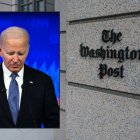A powerful Democratic senator assembles a coalition to convince Biden to retire during "Critical days for the campaign"
This is Mark Warner of Virginia, who also chairs the Intelligence Committee in the upper chamber. According to The Washington Post, he is trying to put together a group of colleagues with the intention of convincing the president to withdraw his candidacy.

Mark Warner
Although Joe Biden continues to assert that he will be the Democratic candidate in November and has even claimed that he will defeat Donald Trump, the conversations behind closed doors are different. This was recently acknowledged by Van Jones, who claimed that "panic reigns" behind the scenes amid speculations about how the first debate could sink the entire Democratic ticket in November. Against this backdrop, a powerful Democratic senator is seeking to assemble a coalition to convince Biden to step aside.
As reported by The Washington Post, Mark Warner (D-VA) "attempting to assemble a group of Democratic senators to ask President Biden to exit the presidential race, according to two people with direct knowledge of the effort."
The senator and former Virginia governor arrived in the Upper House in 2009 and currently serves as chairman of the Intelligence Committee, one of the most important on Capitol Hill.

Politics
Pressure mounts: Big Democratic funders will stop donating money until Biden withdraws
Emmanuel Alejandro Rondón

According to information obtained by the aforementioned media source, Warner is convincing his colleagues that "Biden can no longer remain in the election as a result of his faltering performance in the debate," given that his name as head of the ballot would damage downticket candidates.
The senator's spokeswoman, Rachel Cohen, neither denied nor confirmed the information released. She merely issued a statement that read as follows: "Like many other people in Washington and across the country, Senator Warner believes these are critical days for the president’s campaign, and he has made that clear to the White House."

Politics
Democratic information war: CNN, NYT and WaPo report that Biden is in the hot seat as the White House tries to convey calmness
Emmanuel Alejandro Rondón

In turn, the Post added that one of the options being considered is a face-to-face meeting between the president and senators, since it could help senators express "their concerns in person."
"Though no sitting Democratic senator has publicly called for Biden to step aside, they’ve privately shared mounting concerns with each other over the past week as they fight an already uphill battle to maintain the Senate majority," they added.
What a Biden candidacy could mean in the Senate
It turns out that 2024 is not just another year, electorally-speaking. It turns out that Class 3 senators are up for renewal, a group that happens to be very unfavorable to Democrats, given that they are defending as many as eight competitive seats, while Republicans should have no trouble retaining all of their seats. For example, the most "vulnerable" Republican senators this cycle are Ted Cruz (R-TX) and Rick Scott (R-FL), who are comfortably leading their races.
The Democratic Party will defend seats in West Virginia, Ohio, Montana, Arizona, Pennsylvania, Nevada, Wisconsin and Michigan, all races that are expected to be competitive and where a weakened Biden could hurt candidates in those states.
Steve Daines, chairman of the National Republican Senatorial Committee (NRSC), a body tasked with getting more Republicans elected to the upper chamber in 2024 and those already there to retain their seats, intervened in the primary process to ensure that all candidates are able to "win a general election."
To that end, he managed to recruit Jim Justicein West Virginia, Tim Sheehy in Montana, Bernie Moreno in Ohio, Kari Lake in Arizona, Dave McCormick in Pennsylvania, Sam Brown in Nevada, Eric Hovde in Wisconsin and Mike Rogers in Michigan.
Democrats currently hold a 51-49 majority, with four independents making up the caucus, so if the GOP manages to win all eight seats they would be very close to the 60 majority that rules in the upper chamber, similar to the circumstances under which Barack Obama took office as president in 2009.

























